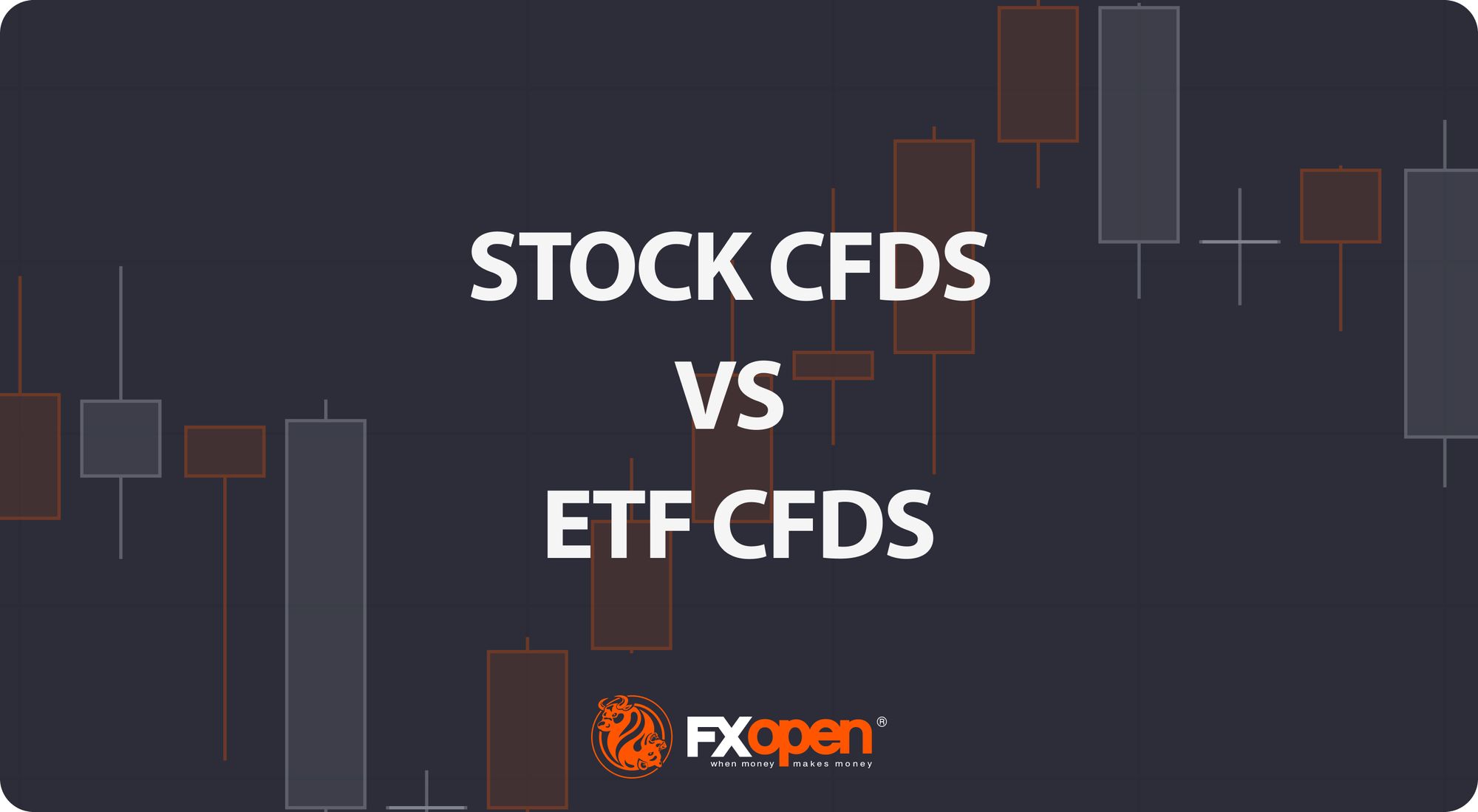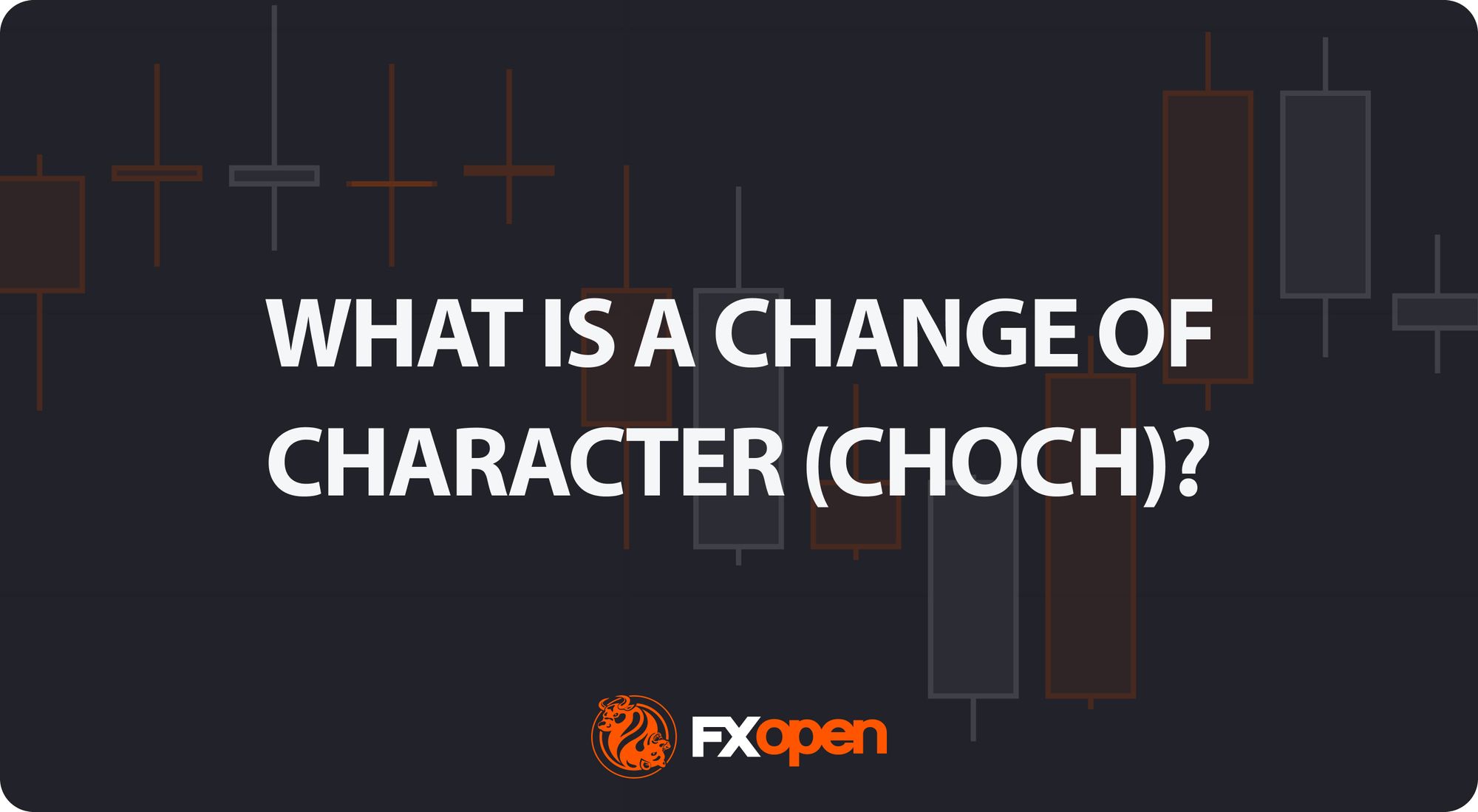FXOpen

Many traders wonder whether it’s worth trading ETFs vs stocks. The truth is that they both offer distinct advantages depending on your strategy. Whether you're drawn to the diversification of ETFs or the high volatility of individual stocks, understanding their differences is key. This article breaks down the difference between stocks and ETFs and the advantages of each.
What Are ETFs vs Stocks?
Although you are well aware of what stocks and ETFs are, let us give a quick overview. ETFs, or exchange-traded funds, are collections of assets like stocks, bonds, or commodities bundled into a single security. Instead of buying individual assets, traders gain exposure to an entire market segment or strategy by trading ETFs. For example, SPY tracks the S&P 500, providing access to 500 major companies in one trade. ETFs are traded on exchanges like stocks, with prices fluctuating throughout the day based on supply and demand.
Stocks, by contrast, signify direct ownership in a particular company. When trading stocks, you’re focusing on the performance of that single entity, whether it’s a household name like Tesla (TSLA) or an emerging small-cap company. In comparing stocks vs an ETF, stocks are often more volatile than ETFs, creating opportunities for traders to capture sharp price movements.
In this article, we will talk about CFDs on ETFs and stocks. Contracts for Difference (CFDs) allow traders to speculate on the rising and falling prices of an asset without owning it. To explore a world of stocks and ETFs, head over to FXOpen’s free TickTrader platform.
Key Differences Between ETFs and Stocks
Understanding the distinctions between an ETF vs stocks is essential for traders aiming to refine their strategies. While both are popular instruments, they behave differently in the market and suit different trading approaches. Let’s break it down.
1. Composition
The primary difference between an ETF and a stock is its makeup. ETFs are baskets of assets like stocks, bonds, or commodities, offering built-in diversification. For example, the Invesco QQQ ETF holds top Nasdaq-listed companies like Apple, Microsoft, and Tesla. Stocks, however, represent a single company. Trading a stock like Amazon (AMZN) means your potential returns depend solely on its performance, while ETFs spread risk across multiple assets.
2. Volatility
Stocks are generally more volatile. A single earnings miss or CEO resignation can send a stock’s price soaring or crashing. ETFs, because they pool multiple assets, experience smaller swings. For instance, SPY’s price tends to move more steadily than a volatile stock like Tesla, making ETFs potentially easier to analyse for certain trading strategies.
3. Liquidity and Trading Volume
Liquidity varies significantly. ETFs tracking major indices like SPY are considered liquid instruments, with high trading volumes. Stocks can be just as liquid, especially large-cap companies, but smaller or niche ETFs and stocks may suffer from lower liquidity and wider spreads or gaps in pricing.
4. Costs
Investing in stocks typically involves just the price of the shares and brokerage fees. ETFs often have expense ratios—annual fees taken from the fund’s value. While these are usually small (e.g., 0.09% for SPY), they’re an added cost traders need to consider.
However, with ETF CFDs, these fees are bypassed, leaving traders with only the broker’s spread and commission to consider. Stock CFDs work similarly, eliminating transaction costs tied to owning the underlying asset.
Advantages of Trading ETFs
Trading ETFs offers unique opportunities that appeal to a range of strategies. Their structure, diversity, and flexibility make them a valuable choice for traders. Here’s what sets them apart:
1. Diversification in a Single Trade
Trading ETFs gives exposure to a group of assets, reducing the risk of being impacted by a single asset's performance. For instance, SPY tracks the S&P 500, spreading risk across 500 companies. This makes ETFs a great way to trade entire sectors or indices without committing to individual assets.
2. Sector or Thematic Focus
ETFs allow traders to target industries, regions, or themes with precision. Whether it's technology through XLK, emerging markets via EEM, or even volatility with UVXY, ETFs open the door to strategies that align with traders’ interests and market views.
3. Lower Volatility
Because ETFs pool assets, they experience less extreme price movements than individual stocks. This steadier behaviour can make them suitable for traders looking to avoid the sharp volatility of single stocks while still taking advantage of price action.
4. Liquidity in Major Funds
Popular ETFs like QQQ and SPY are highly liquid, which may contribute to tighter spreads. Their volume also supports smooth execution for both large and small positions.
5. Accessibility Through CFDs
Many traders prefer ETFs via CFDs, which allow traders to open buy and sell positions without owning the underlying asset. CFDs often provide leverage, giving traders the potential to amplify returns while keeping costs tied to spreads and commissions instead of fund expense ratios (please remember about high risks related to leverage trading).
Advantages of Trading Stocks
Trading stocks offers a direct and focused way to engage with the market. In ETF trading vs stocks, stocks may provide unique opportunities for traders who are drawn to fast-paced action or want to specialise in specific companies or sectors. Here’s what makes trading stocks appealing:
1. High Volatility for Bigger Moves
Stocks often experience significant price swings, creating potential opportunities for traders to capitalise on sharp movements. For example, earnings reports, product launches, or market news can drive stocks like Tesla (TSLA) or Amazon (AMZN) to see dramatic intraday price changes.
2. Targeted Exposure
With stocks, traders can zero in on a single company, sector, or niche. If a trader believes Apple (AAPL) is set to gain due to new product developments, they can focus entirely on that potential without being diluted by other assets in a fund.
3. News Sensitivity
Stocks respond quickly and significantly to news events, providing frequent trading setups. Mergers, management changes, or regulatory updates often result in immediate price movements, making them popular among traders who thrive on analysing market catalysts.
4. Wide Range of Opportunities
The sheer variety of stocks—from large-cap giants to small-cap companies—offers endless opportunities for traders. Whether trading high-profile names like Nvidia (NVDA) or speculative small-caps, there’s something for every trading style and risk tolerance.
5. Leverage with CFDs
Stocks can also be traded via CFDs, allowing traders to take advantage of price movements with smaller initial capital. This opens the door to flexible position sizes and leverage, amplifying potential returns in active trading.
ETFs for Swing Trade and Day Trade
ETFs cater to both swing and day traders with their diverse offerings and high liquidity. Some popular swing trading ETFs and ETFs for day trading strategies include:
ETFs for Swing Trading
- SPY (S&P 500 ETF): Tracks the S&P 500, offering exposure to large-cap US companies with steady trends.
- IWO (Russell 2000 ETF): Focuses on small-cap stocks, which tend to be more volatile, providing swing traders with stronger price movements.
- XLK (Technology Select Sector SPDR): A tech-heavy ETF that moves in response to sector trends, popular for capturing medium-term shifts.
- XLE (Energy Select Sector SPDR): Tracks energy companies, useful for swing traders analysing oil and energy market fluctuations.
Day Trading ETFs:
- QQQ (Invesco Nasdaq-100 ETF): Offers high intraday liquidity and volatility, making it a favourite for fast trades in tech-heavy markets.
- UVXY (ProShares Ultra VIX Short-Term Futures ETF): A volatility ETF that reacts quickly to market fear, providing potential opportunities for rapid price changes.
- XLF (Financial Select Sector SPDR): Tracks financial stocks and has consistent volume for capturing short-term sector-driven moves.
Stocks for Swing Trading and Day Trading
Selecting the right stocks is crucial for effective trading. High liquidity and volatility are key factors that make certain stocks more suitable for swing and day trading. Here are some of the most popular options for both styles:
Stocks for Swing Trading
- Apple Inc. (AAPL): Known for its consistent performance and clear trends.
- Tesla Inc. (TSLA): Exhibits significant price movements, offering potential opportunities to capitalise on medium-term swings.
- NVIDIA Corporation (NVDA): A leader in the semiconductor industry with strong momentum, suitable for capturing sector trends.
- Amazon.com Inc. (AMZN): Provides steady price action, allowing traders to take advantage of consistent movements.
Stocks for Day Trading
- Advanced Micro Devices Inc. (AMD): High daily volume and volatility make it a favourite among day traders.
- Meta Platforms Inc. (META): Offers substantial intraday price swings, presenting potential trading opportunities.
- Microsoft Corporation (MSFT): Combines liquidity with moderate volatility, suitable for quick trades.
- Alphabet Inc. (GOOGL): Provides consistent intraday movements.
How to Choose Between an ETF vs Individual Stocks for Trading
Choosing between stocks and ETFs depends on your trading goals, strategy, and risk appetite. Each offers unique advantages, so understanding their characteristics can help you decide which suits your approach.
- Risk Tolerance: Stocks often come with higher volatility, making them attractive for traders comfortable with sharper price movements. ETFs offer diversification, which can reduce the impact of individual market shocks.
- Trading Strategy: For short-term trades, highly liquid ETFs like QQQ or volatile stocks like TSLA might be considerable. If you're swing trading, ETFs and large-cap stocks may provide steady trends.
- Market Focus: In individual stocks vs ETFs, ETFs give access to broad sectors or indices, popular among traders analysing macro trends. Stocks allow for focused plays on individual companies reacting to earnings or news.
- Time Commitment: Stocks typically require more monitoring due to their rapid price changes. ETFs, especially sector-specific ones, may demand less frequent attention depending on your strategy.
The Bottom Line
ETFs and stocks may offer unique opportunities, whether you're targeting diversification or sharp price movements. By understanding the differences between ETFs versus stocks and aligning them with your strategy, you can take advantage of different trading conditions. Ready to start trading? Open an FXOpen account today to access a wide range of ETF and stock CFDs with trading conditions designed for active traders.
FAQ
What Is an ETF vs a Stock?
ETFs (exchange-traded funds) are collections of assets, such as stocks or bonds, combined into a single tradable unit. They offer built-in diversification, as buying one ETF provides exposure to multiple assets. Stocks, in contrast, signify ownership in an individual company.
Should I Trade the S&P 500 or Individual Stocks?
Trading the S&P 500 (via ETFs like SPY or through index CFDs) provides exposure to the 500 largest US companies, reducing reliance on any single stock. Individual stocks offer higher volatility and opportunities for sharper price movements. Evaluate your strategy and risk tolerance to choose the suitable asset.
ETFs vs Individual Stocks: Which Is Better?
Neither ETFs nor individual stocks are inherently better—it depends on your goals. ETFs offer diversification and potentially lower volatility, making them suitable for broad market exposure. Stocks provide targeted opportunities from individual company performance.
Do ETFs Pay Dividends?
Yes, ETFs often pay dividends when their underlying holdings generate income. These are typically paid out periodically, similar to dividends from individual stocks. However, when trading CFDs, dividends are not paid in the traditional sense, as you do not own the underlying asset. However, adjustments are made to your account to reflect dividend payments.
Can I Sell ETFs Anytime?
ETFs trade on exchanges during market hours, making them highly liquid. Therefore, you can buy or sell ETFs on specific days and hours.
This article represents the opinion of the Companies operating under the FXOpen brand only. It is not to be construed as an offer, solicitation, or recommendation with respect to products and services provided by the Companies operating under the FXOpen brand, nor is it to be considered financial advice.
Stay ahead of the market!
Subscribe now to our mailing list and receive the latest market news and insights delivered directly to your inbox.








